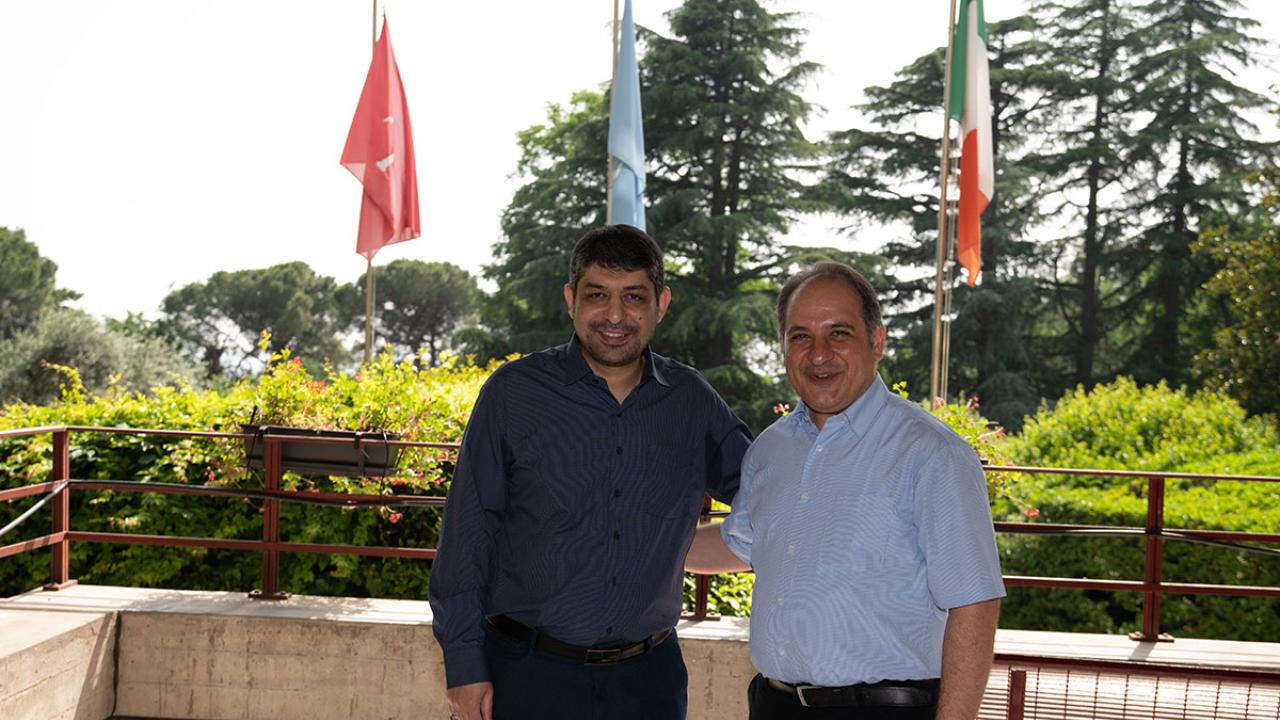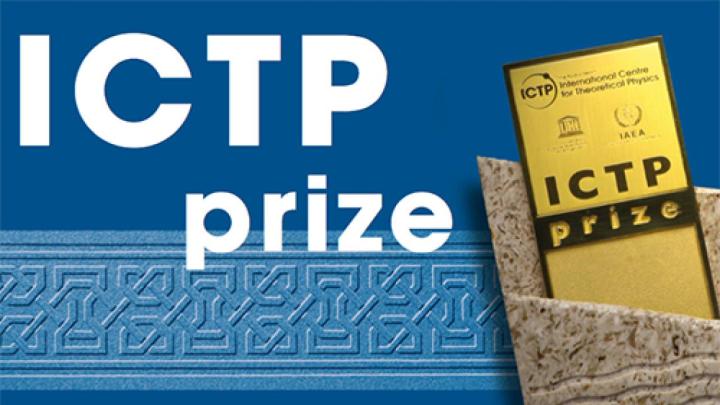
Every year, the ICTP Prize is awarded to young scientists from developing countries for outstanding contributions to a field within physics, in honour of a physicist from the same field. The 2022 award is shared by two outstanding Iranian cosmologists: Shant Baghram of Sharif University of Technology and Mohammad Hossein Namjoo of the Institute for Research in Fundamental Sciences, both in Tehran. The prize honours their pioneering contributions to developing robust theoretical, computational and statistical frameworks that compare theoretical predictions for cosmological and astrophysical phenomena with high-precision observational data.
The 2022 ICTP Prize is dedicated to the late Russian physicist Valery Rubakov for his seminal work at the interface between particle physics and cosmology.
The Prize ceremony took place on Wednesday 21 June 2023 in the Budinich Lecture Hall (view the recording here). Below, the winners share their thoughts on their research and plans for the future.
What drew you to cosmology?
Shant Baghram: It is a very long-term passion for me. I was fascinated by astronomy and cosmology from primary school. This passion developed because one of our relatives, who studied physics at university at that time, had a telescope at home. I am very blessed that I studied at the Physics department at Sharif University, Tehran, which increased my interest in cosmology.
Mohammad Hossein Namjoo: I’ll start by telling you what drew me to physics. I was—and still am—amazed by how well we are able to describe our external world with mathematics; a purely abstract framework we developed out of our imagination. These two things (i.e., the external world and mathematics) could have been two entirely detached subjects of interest to human beings. But, in fact, they are pretty much related, and this connection makes physics so interesting to me. Cosmology is no exception. But cosmology is even more amazing, since we are talking about the universe as a whole; an object so large and complex that it’s hard to even comprehend what the big numbers associated with it mean. Still, our creative vision and the deep link between physics and mathematics allow us to learn a lot about how our cosmos behaves. Isn’t it wonderful?
What frameworks have you developed to compare prediction with observational data?
SB: Due to the vast amount of data from large-scale structures in the cosmos, it is essential to have statistical and semi-analytical models to compare the predictions of theories with observation. My colleagues and I try to develop models for counting the number density of dark matter halos, their biases and merger rates, within the framework known as Excursion Set Theory.
MHN: Dark matter is a contributor to the gravitational dynamics of the universe, and accounts for 25% of the universe’s energy budget. The particle nature of dark matter (if indeed it has such a nature) is unknown, but several candidates are proposed, which are currently indistinguishable according to available observational data. My collaborators and I developed a formalism that is particularly suitable for studying dark matter if the dark matter particle mass is sufficiently small (namely, they are ultra-light). Our approach allowed us to accurately describe the similarities and differences that such dark matter candidates exhibit, compared with other candidates. These results are crucial for using future observational data to discriminate dark matter candidates, hopefully leading to the discovery of what dark matter is made of.
“The fact that this much progress is occurring in physics and cosmology in Iran is heart warming.” - Prize winner Shant Baghram.
What is the current focus of your research?
SB: My main focus nowadays is to check the observational hints of cosmological models, which are beyond the standard model of cosmology. For example, we are developing a non-local extension of general relativity. We found a couple of cosmological solutions to this theory within specific limits, and now we want to see if we can resolve the known tensions of the standard model, or find some new observables. Also, I am interested in developing non-linear structure formation models and statistical probes to distinguish between cosmological models.
MHN: My current research may be divided into three different (but not necessarily disjointed) themes. (i) Early universe cosmology, which discusses the evolution of the universe when it was very young and concerns how this evolution affects what we see today. (ii) Dark matter: its different candidates and its observable cosmological effects. (iii) More fundamental (and rather philosophical) questions such as the possibility of living in a multiverse—rather than a single universe—and how one can possibly do science in such a fundamentally novel situation.
What does winning this award mean to you?
SB: It means a lot. I first visited ICTP in 2008 when I was a first-year PhD student. After 15 years, winning a prize dedicated to the memory of the late Professor Valery Rubakov, who lectured us that year, means a lot. It means that we are on the right path, and the fact that this much progress is occurring in physics and cosmology in Iran is heart warming, although I know there is still much to do. It is a great responsibility for me, to achieve this honour.
MHN: It feels great and really encouraging to see that the community recognizes your efforts, and I’m grateful for that. More broadly than my personal impression, this achievement shows that doing creative science is feasible without relying on being in an ideal situation with all the ingredients for research available. With more effort and enthusiasm one can overcome many difficulties, most of which are out of one’s control (such as issues related to sanctions and visa refusals). I think this award will spread hope to young scientists who may encounter similar difficulties.
“Doing creative science is feasible without relying on being in an ideal situation with all the ingredients for research available.” - Prize winner Mohammad Hossein Namjoo.
What are your research plans for the future?
SB: It will be a great leap if we can join international collaborations at the frontier of cosmology, mainly in gathering, preparing and analysing the data from ongoing and future ground/space-based telescopes. Also, I hope that the cosmology community in Iran becomes an important scientific hub in theory and observation.
MHN: I’m eager to learn and am a bit ambitious. I’d like to explore new areas and seek new collaborations. This would allow me to learn about new topics and help to develop novel ideas.


















